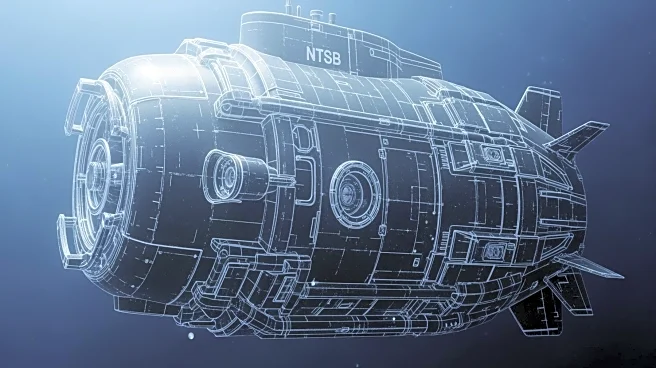What's Happening?
The National Transportation Safety Board (NTSB) has released a report on the loss of the Titan submersible, which sank off Newfoundland in 2023, resulting in the deaths of all five individuals aboard, including OceanGate's founder and CEO Stockton Rush.
The report aligns with previous findings from the U.S. Coast Guard, indicating that the sub's carbon fiber hull was inadequately engineered and failed to meet necessary strength requirements. OceanGate reportedly ignored warning signs of damage from prior dives, and its procedures and testing were insufficient to mitigate risks. The submersible, designed for deep-sea exploration, was marketed to high-net-worth individuals for scientific expeditions, despite lacking proper classification or a Coast Guard Certificate of Inspection. The NTSB found construction flaws, including voids between hull layers, which may have contributed to the sub's implosion at 3,300 meters depth during a dive at the Titanic wreck site.
Why It's Important?
The NTSB's findings underscore significant safety and regulatory concerns in the operation of deep-sea submersibles. The report highlights the potential dangers of inadequate engineering and the consequences of circumventing established safety protocols. The incident raises questions about the oversight of private companies in high-risk industries and the adequacy of current regulations governing passenger vessels. The loss of the Titan submersible serves as a cautionary tale for the industry, emphasizing the need for stringent safety standards and comprehensive lifecycle analyses to prevent similar tragedies. Stakeholders in the maritime and engineering sectors may need to reassess their practices and regulatory frameworks to ensure the safety of future deep-sea explorations.
What's Next?
The NTSB's report may prompt regulatory bodies to review and potentially tighten regulations surrounding the operation of submersibles and other high-risk vessels. There could be increased scrutiny on companies offering deep-sea expeditions, with a focus on ensuring compliance with safety standards and proper vessel classification. The maritime industry might see a push for more rigorous testing and certification processes to prevent similar incidents. Additionally, OceanGate and other companies in the sector may face pressure to improve their safety cultures and operational practices to align with established technical standards.
Beyond the Headlines
The Titan submersible incident highlights broader ethical and legal implications regarding the commercialization of deep-sea exploration. The pursuit of cost reduction at the expense of safety raises questions about corporate responsibility and the ethical considerations of marketing high-risk expeditions to the public. The tragedy may lead to discussions on the balance between innovation and safety in the industry, as well as the role of regulatory bodies in safeguarding public interest. Long-term, this incident could influence cultural perceptions of deep-sea exploration and the trust placed in private companies undertaking such ventures.















